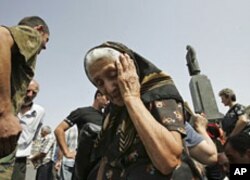Three years after the 2008 war between Georgia and Russia, the temporary ceasefire lines between the two look increasingly like permanent borders.
In the heart of the Caucasus mountains, this ancient Georgian watch tower is useful once again. From the top, Adam Bartnicki, a European military monitor, studies military movements on the South Ossetian side of a ceasefire line.
Through powerful binoculars he sees two new Russian bases nearing completion. “In the area of our responsibility we have maybe nine or 12 Russian Federation border guards' bases. They are like mushrooms,” said Bartnicki.
With their barracks, high fences and security lights, the new bases are home to 5,000 Russian military personnel stationed in South Ossetia - more than 10 times the number before the war.
Nearby, Lia Chlachidze is one of the few civilians remaining in the border village, Ergeneti, Georgia. She lives among the abandoned grape arbors and charred ruins of 140 Georgian farmhouses burned during the five-day war.
“My parents are buried in the occupied territory," she said. "Who knows how many years will pass before I'm able to visit them. It's a human tragedy. I can't talk about it without crying."
Once a thriving market town, Ergeneti is now the end of the road for Georgia. At the heavily guarded police check point, the boundary is only crossed by stray dogs.
To the south, at a refugee camp in Gori, Nanuli Pervashvili bakes rolls for her family of four. She fled her apartment in South Ossetia, when the fighting started. “We left empty handed,” said Pervashvili.
Nearby, five Georgian men gather for a game of backgammon - on a weekday morning. Shalva Erbakidze said they cannot return home. "We don't work. They won't hire our people. Because we are refugees,” he said.
In Tbilisi, Georgia’s capital, debate rages again among Georgians as the August 8th war anniversary approaches.
Opposition politician Nino Burjanadze says Georgia’s government will be celebrating a defeat on Monday.
“Last year I raised a question to the government: We celebrated the 8th of August with fireworks and with concerts. I asked, "What did we celebrate? What are we celebrating for?" If we really won something, why does nobody in Georgia know about that including me?,” he said.
In response, Georgian Foreign Ministry spokesman Tornike Gordadze says that the government celebrates defeating the Kremlin’s attempt to install a friendly, authoritarian government in Georgia.
“We have survived. It was a very serious attempt to destroy our statehood," he said. "And the very objective of this war was not the occupation of these two regions, which still remain occupied today as 20 percent of the Georgian territory. But the objective was to destroy the current government and the current regime, to change the regime in Georgia.
One week before the anniversary, United States Marines wound up training exercises for Georgian soldiers. Officially, it was to prepare the Georgians for duty in Afghanistan. But many see these well publicized joint training exercises as a message that the West is watching the Russian military with more than binoculars.











